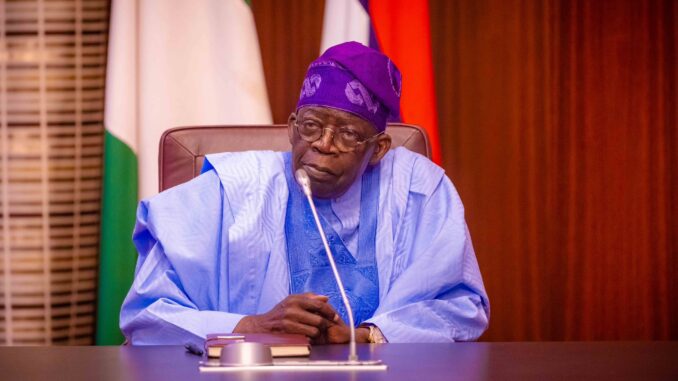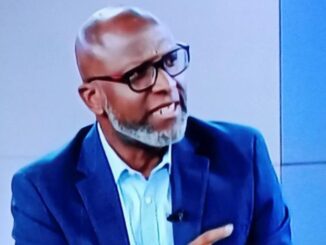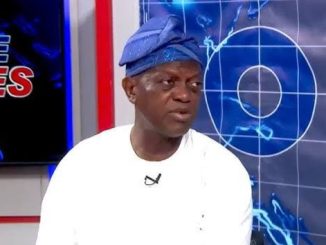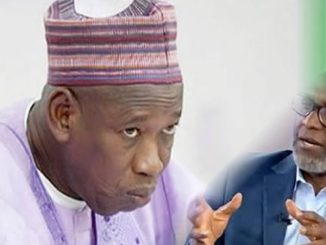
• Highlights Plight of poor children, calls for equitable economic reforms
By Marvellous Nyang
June 7, 2024
Former presidential aide, Laolu Akande, has called on President Bola Tinubu to consider granting a living wage to Nigerian workers, as he rightly posited before becoming president, and to prioritise it above the minimum wage amid the ongoing national discourse.
He said this on Friday, while speaking on Channels TV during another engaging edition of his popular talk show, “Inside Sources with Laolu Akande, on “My Take” segment, where he delivered a compelling message underscoring the urgency of addressing the dire conditions faced by the workforce and many Nigerians.
“Here is my take for the week entitled, ‘Let us make it a living wage indeed,'” Akande began, saying, “The intensity of the debate and the national discourse on the minimum wage issue is symptomatic of the current living conditions of the critical masses of our people.”
“It is by no means the problem of the current administration or current political leaders. This is an accumulation of several years of poor planning, bad governance and uninspiring leadership at many levels,” Akande noted.
He criticised the historical mismanagement that has led to the devaluation of Nigeria’s currency and the persistent opulence of the country’s elite, saying, “In this country, we have seen how the value of our currency has depreciated beyond imagination because of poor choices made decades ago without any significant recovery as yet, in this country, we have witnessed the unabated, ostentatious lifestyle of the high and mighty.”
Akande condemned the disconnect between government officials and the populace, noting, “Leaders in government who carry on as though they can remain aloof to the incessant speculation of the living conditions of the majority of Nigerian people.”
He lamented the inadequate support for the poor, who are often left to fend for themselves, sometimes turning to criminality as a means of survival.
“In this country, we have seen how leaders take care of themselves in spite of bad governance, leaving the critical masses of our people to fend for themselves, giving them the short end of the stick.
“Now, in many instances, they are left alone without any societal support in their favour, many of our poor people have resorted to criminality, just as a means for self-actualisation and economic survival.”
Addressing the issue of criminality, Akande quoted Dr Charles Apoki, who described it as “an intelligence, looking for an avenue for manifestation in the midst of oppression and deprivation,” as he elaborated, “Let us be clear about it, any act of criminality must be condemned and we must fight it very strongly.
“Well, we are aware that some of our public intellectuals have actually defined criminality in a very interesting way. It was one of them, Dr Charles Apoki, in a very viral podcast who defined criminality thus: He said that criminality is an intelligence, looking for an avenue for manifestation in the midst of oppression and deprivation. Now, that must give cause for serious concern, and it must give first for honest reflection by all of us as a people,” Akande said.
The concern of the veteran journalist also touched on the deteriorating state of public education, which he said has become increasingly inaccessible to the poor.
Akande recalled a time when children from all backgrounds attended the same schools and had equal opportunities for success, a stark contrast to the current situation where many children no longer attend school or do so under abysmal conditions.
“So now, we are entangled in a national debate, a living wage versus a minimum wage. In a society where public schools have virtually disappeared to the tune that the children of the poor can’t afford good education anymore.
“Poor students who are brilliant and intelligent used to go to the same schools as the children of the high and mighty, even though they came from a poor background, but they got a decent chance an opportunity to make it good in life, and many of them actually did,” Akande said.
He criticised the excuses given by leaders regarding economic challenges while their personal lifestyles remain unchanged.
“Our leaders say that the times are tough, that the government has no money. The economy is bad. The government is struggling, but we don’t see their lifestyles change. Politicians are busy building bridges and roads with billions of naira, and now trillions of naira.
“But we are in a serious disagreement on what should be the minimum wage, more and more of our people are becoming poor, citizens are becoming hopeless and they are being pushed farther and further away from civilisation,” Akande lamented.
ALSO READ: Time for state police is now — Laolu Akande
He continued to highlight the disparity between private sector profits and the state of public wages, noting, “They are being told by employers that they can afford a living wage, that state governments can’t afford to pay a decent minimum wage. Yet, companies such as banks in our country are declaring large amounts of billions in profit and many state governments are chattering private jets to move their governors from one place to the other.”
Akande’s powerful words resonate as a call to action for leaders, especially the president to prioritise the welfare of the nation’s most vulnerable citizens.
Concluding, in his remarks, Akande directly addressed President Tinubu, urging him to uphold his commitment to a living wage, saying, “Mr. President, as we conclude, your agenda is called renewed hope. And it was you who spoke early about a living wage rather than a minimum wage. And we must commend you, sir. But please, continue with our charge. And don’t stop until you can restore them from the way we treat the lowliest and the poorest among us.”
Akande’s heartfelt appeal called on the political elite to consider the moral implications of their actions and the necessity of providing equal opportunities for all Nigerians.
He queried, “What is our joy as political elite if poorer people and their children can’t get a good chance to break free from deprivation in life? What is our joy if the children of the poor cannot get an opportunity for a good education so that they can escape misery? What is our joy as political elite if poorer people and their children can’t get a good chance to break free from deprivation in life? What is our joy if the children of the poor cannot get an opportunity for a good education so that they can escape misery? What is our joy?
Akande, however, charged, “We can do it as a people, our conscience compels it and our God expects it. Let us make it a living wage. Let a living wage be a possibility in Nigeria and there you have my take for the week.”




